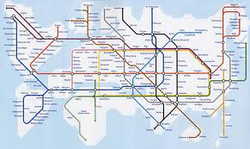Updated: July 5, 2012 (Initial publication: June 26, 2012)
Breaking news

Updated: June 19, 2012 (Initial publication: June 14, 2012)
Releases : Neutrality in Systems of Economic Regulation

TRANSLATED SUMMARIES
ENGLISH
"Acting in a neutral way" is an oxymoron. "Companies often require however that States use their powers in a neutral way (eg tax neutrality). In regulated sectors, some are right or even duty , of not being neutral. Firstly, it is the State, which requires the market for other purposes, other temporalities and other values. Secondly, they are also the "crucial operators", which are sort of regulators of second degree, such as transmission system operators or companies capital markets firms. The difficulty increases when the systeme requires neutrality of regulators and judges, when first build economic policy and the second create jurisprudence. Their consistency, impartiality and rationality can create an objectifiable neutralitys
FRENCH
«Agir de façon neutre» est un oxymoron. «Les entreprises ont souvent besoin, cependant, que les États utilisent leurs pouvoirs de manière neutre (neutralité fiscale par exemple).
Dans les secteurs réglementés, certains ont le droit ou même le devoir de ne pas être neutre. Tout d’abord, c’est l’État, qui insère le marché à d’autres fins, d’autres temporalités et d’autres valeurs. En second lieu, ils sont aussi les «opérateurs crucial», qui sont des sortes de régulateurs du second degré : par exemple les opérateurs de réseaux de transport ou de entreprises de marchés financiers.
La difficulté augmente lorsque le systeme économique et politique exige la neutralité des autorités de régulation et des juges, alors que les premiers construisent la politique économique et les seconds construisent la jurisprudence. Le respect qu'ils doivent avoir de l'impartialité et d'une rationalité suffisamment objectivables pourra permettre cette objectivité requise.
Updated: June 19, 2012 (Initial publication: June 14, 2012)
Contributions

Updated: June 1, 2012 (Initial publication: May 24, 2012)
Breaking news

Updated: April 3, 2012 (Initial publication: March 26, 2012)
Contributions

Updated: Jan. 16, 2012 (Initial publication: Oct. 6, 2011)
Translated Summaries

Updated: Jan. 3, 2012 (Initial publication: Jan. 2, 2012)
Contributions

Updated: Jan. 2, 2012 (Initial publication: Jan. 2, 2012)
Releases : Neutrality in Systems of Economic Regulation

Translated Summaries
In The Journal of Regulation the summaries’ translation are done by the Editors and not by the authors
ENGLISH
The debate on Net Neutrality faces a major difficulty, namely that of its legal status: does there exist a “legal principle”—meaning a rule somewhere within the entire body of law—with mandatory force that could be used to counter infrastructure operators’ discriminatory practices?
FRENCH
Le débat sur la neutralité du Net fait face à une difficulté majeure, à savoir son statut juridique: existe-t-il un «principe juridique», qui exprime une règle dans l’ensemble du système juridique - avec une force obligatoire qui pourrait être utilisée pour contrer les pratiques discriminatoires des opérateurs d’ infrastructure ?
SPANISH
El debate sobre la Neutralidad de la Red se enfrenta a una gran dificultad, primordialmente en cuanto a su estatus legal: ¿realmente existe un “principio legal” – es decir, una regla que se encuentra dentro de la disciplina del derecho – con fuerza mandataria que podría ser usado para enfrentar a las prácticas discriminatorios que practican los operadores de infraestructura?
ITALIAN
Il dibattito sulla neutralità della rete si trova di fronte ad una difficoltà rilevante dal punto di vista del suo fondamento giuridico: esiste una norma giuridica obbligatoria – intesa come una norma legale – che possa essere utilizzata contro le pratiche discriminatorie degli operatori?
....................
Other translations forthcoming.
Updated: Dec. 21, 2011 (Initial publication: Dec. 21, 2011)
Thesaurus : Doctrine
Updated: Dec. 8, 2011 (Initial publication: Sept. 4, 2011)
Releases : Neutrality in Systems of Economic Regulation

Translated Summaries
In The Journal of Regulation the summaries’ translation are done by the Editors and not by the authors
ENGLISH
Article: What does it mean to be neutral ? Socrates in the land of regulators
Should regulatory agencies, as we define them in today’s economic and cultural world, be obligated to be neutral in accomplishing their regulatory activities? What would the meaning of such an obligation be?
ITALIAN
Articolo: Cosa vuol dire essere neutrale? Socrate nella terra dei regolatori
Le autorità di regolazione, come sono denominate oggigiorno nel mondo economico e culturale, dovrebbero essere obbligate ad essere neutrali quando compiono le loro attività di regolazione? Quale sarebbe il significato di un tale obbligo?
.....................
Other translations forthcoming.
Updated: Oct. 19, 2011 (Initial publication: Oct. 14, 2011)
Contributions

